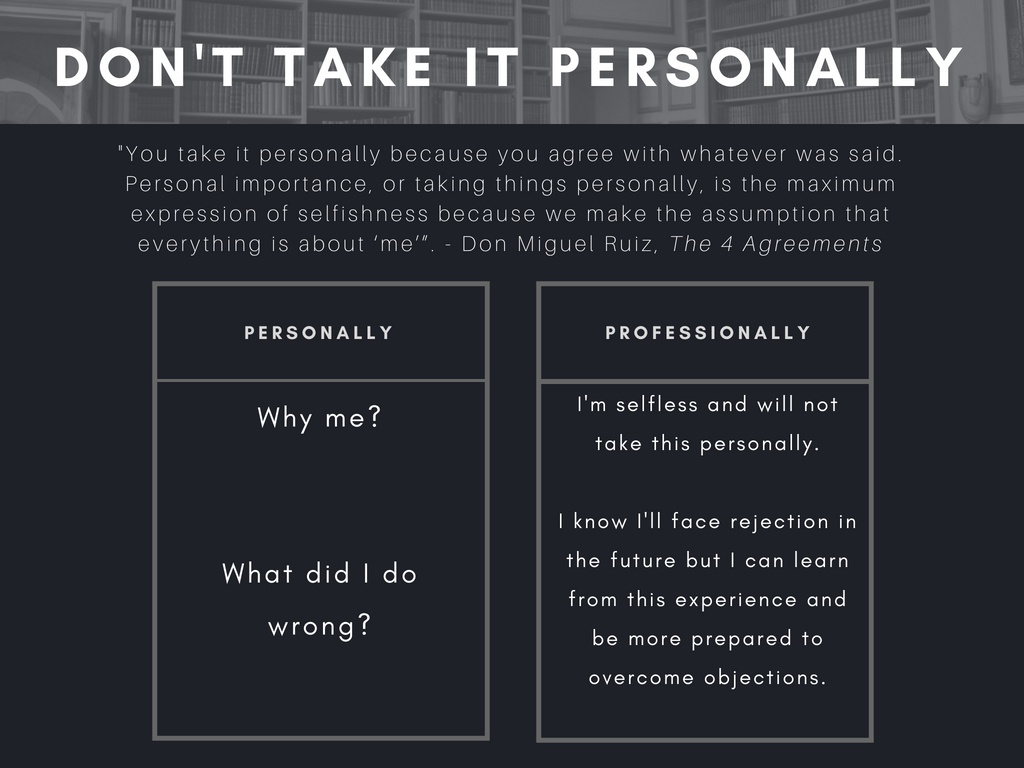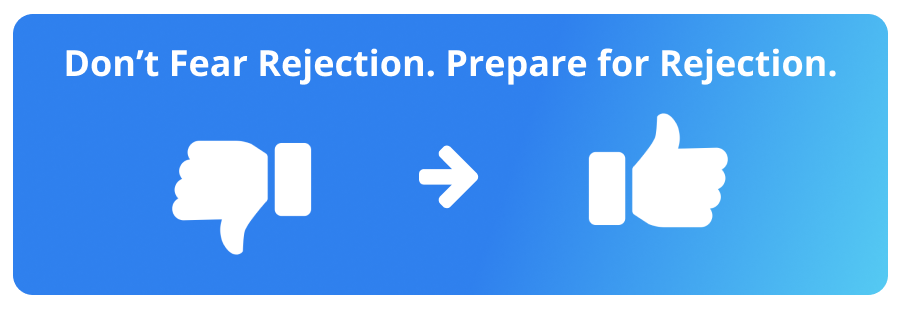No one likes being rejected, but it’s a part of life. Rejection might stir up childhood feelings from when you weren’t asked to play on a team or were picked last. It didn’t feel good as a kid and it doesn’t feel good now that you’re a professional. Let’s look at how we can turn feelings of rejection into something positive and empowering to boost your level of success.
Don’t Take It Personally
I think one of the biggest mistakes we make, after being rejected, is that we take it personally. Stop taking it personally! You’re going to face rejection repeatedly throughout your career so now is the time to learn how to cope with it. We can formulate new ways of thinking to overcome rejection and, instead of taking it personally, look at it as a means of bettering ourselves and moving towards success.

Let’s say you’ve been talking to homeowners about selling their home and suddenly you receive a text message saying they are going with a different agent. You start to think “why me?”, “what did I do wrong?”, “how many more times is this going to happen?”. These responses expose our vulnerabilities. Change your thinking by coming up with a constructive way to handle the rejection and move forward:
Taking it personally: “What did I do wrong?”
Coming up with a positive solution: “What can I do to overcome this and prepare myself to be stronger and more knowledgeable the next time around?”
Make a follow-up call to learn more from the client and why they chose another agent. Maybe the agent they chose knew more about the neighborhood the family’s seeking. Whatever the case may be, don’t take it personally. Be prepared to overcome this rejection in the future by learning more about the neighborhood, creating a video illustrating the benefits of living there, and then share the video on social media and with future clients. Rejection will never stop happening, but you can avoid taking it personally, learn from it and recognize that there will always be other opportunities.
Change Your Reaction
How you verbally respond to rejection is important to consider as well. Do you become defensive? Angry? Aggressive? Quiet? Recognize how you react and what goes through your mind when you’re rejected. Your thoughts affect the outcome of every interaction so take time to learn the most effective ways to respond to rejection, and your prospects, so you can project yourself in a professional manner.
How you react to a situation can affect your chances of receiving future referrals. Instead of getting upset, have compassion and be understanding when a client says they don’t want to renew their contract once the listing expires. Don’t jump to conclusions about why they aren’t renewing. Calmly ask questions about what led them to make the decision so you can learn from the experience. It might not be about you but something much bigger, like the recent death of a family member. Leave the customer with a positive impression by reacting in a calm and professional manner. This will increase the chance of them speaking highly about you, which may lead to future referrals.
Ineffective reaction: Angry, jumping to conclusions
Effective reaction: Calm, seeking answers to improve performance
The way you react physically can also make a difference when dealing with rejection. When a client tells you they’re considering pulling their house off of the market, are your arms folded across your chest? Are you gritting your teeth? Are you leaning away from them? Your body language can have a negative impact on the outcome of a discussion. Try to maintain a relaxed posture when dealing with face-to-face rejection. By staying calm and physically relaxed, you will help put the client at ease and reduce the chances of creating a negative impression and possible rejection.
Keep your physical self relaxed: soft facial expression, head held steady, arms at your sides (or in hands in your lap if seated - not clasped), feet hip-width apart with weight balanced evenly (if seated, lean back in your chair).
Visualize
Before making a phone call, or going into a meeting, visualized how you want the encounter to go. With visualization, you create positive scenarios in your head that will help nip rejection in the bud before it has a chance to happen. Whether you realize it or not your mind cannot tell the difference between something you've visualize and something that's real. Imagine having visualized a successful meeting with a client and realizing, at the end of the meeting, that it turned out exactly as you had imagined. That’s the power of visualization! It helps you reprogram your mind to get what you desire (think Olympic athletes). When faced with rejection, take time to visualize how you can overcome it so it’s easier to overcome it in the future. Practice overcoming obstacles and rejection through visualization and the next meeting you hold will likely be a successful one.
Change Your Energy
Do whatever it takes to create positive energy and change your physical state, before meeting with a prospect or client. Jump around or clap your hands vigorously to increase your energy. If you go into a listing presentation with high energy, confident you’re going to get the listing contract, you’ll increase the likelihood of walking away with a signed agreement. If you lose a contract, don’t let it negatively affect the rest of your day. Turn your day around by recalibrating your physical energy and pushing through to the next appointment or phone call.
Role Playing
Be prepared to overcome rejection by role playing with your associates or friends. As you role play various scenarios, you’ll build an arsenal of practiced responses that will prepare you to overcome client rejections. Whether you’re on the phone with a lead or doing a listing presentation with a potential seller, practiced responses will keep you in control of the discussion and limit the chances of losing a deal.
Practicing responses and scenarios over and over will help you handle them with confidence and you’ll build up a thicker skin when it comes to rejection. As you find strategies working in your favor, you will start to develop predictable ways to handle situations and attract clients to you. By envisioning how you’re going to handle rejection before it happens, you will learn to overcome it with ease. Role playing is a great tool for building success and overcoming rejection.
Massive Goals
Set massive goals and get excited about them. Think about what you would like to possess as you become more successful. A luxurious home? An expensive car? Money to donate to your favorite cause? Money to raise a family? Travel? Once you’ve figured out what goals motivate you, post them somewhere where you’ll see them multiple times per day -- on the bathroom mirror, on your keychain, on your computer monitor, etc. Writing down your goals increases the likelihood of them coming true.
Small goals, like acquiring 5 new sellers at the next open house you host are important and worthy but by setting massive goals, you'll produce massive results. When making calls to leads, for example, call 50-100 in one sitting. By calling massive amounts of leads, you will find yourself getting into a rhythm, perfecting your phone skills and handling rejection with ease. Set massive goals, focus on them daily and keep pushing until you achieve them. This kind of goal setting will propel you into a new realm of success and rejection will seem small and meaningless.
Massive goals: 100 lead calls today; $500,000 increase in earnings over the next 6-8 months
Not getting enough leads to set a goal like the one mentioned above? Consider purchasing human-verified leads from Real Estate Pipeline.
Listening & Relating to the Customer
Are you facing rejection as a result of poor listening skills? Sometimes we’re so focused on getting the contract or closing a sale that we forget to really listen to our clients. Practice patience, acknowledge client concerns and then offer solutions; it will be much easier for them to build trust in you. Listen then repeat their concern as you reply with a solution. When someone knows they’re being heard, they will be more receptive to your suggestions and less likely to reject you and your efforts. Here’s an example:
“I understand your concern about having strangers in your home during open houses. I’ve had other clients with the same concerns and we found the best way to handle it is to…..”.
If you can find something you have in common with the prospect, you can use it to build rapport. Maybe you have learned that your client loves vintage cars, a passion of your own. Use this topic to get the conversation moving and have fun with it. Then you can gently move onto the business at hand, like signing a listing agreement. By having hobbies or other things in common with prospects, you will find it’s easier to build rapport.
Presentation Skills
Whether you’re on the phone or standing in front of a prospect, work on improving your presentation skills to be most effective as a real estate agent. Review your performance regularly and don’t hesitate to get feedback from other agents and friends. The more confident you are at presenting yourself, the more apt you are to get want you want from the meeting. Your confidence, willingness to be helpful, and professional knowledge will take you far when it comes to converting leads into sales.
Maybe your goal this afternoon is to call 5 expired listings in hopes of scheduling appointments with sellers. Take notes during each call, noting any resistance from the contact and any favorable reactions to what you said. Let’s say the first 3 calls led to rejection and the last 2 led to appointments. Sit back and review your notes to see where you can improve and which questions led to the best results. Here are some possible outcomes:
- You came on strong at the beginning of the call, mentioning how you could sell their home based off of your credentials, and the prospects seemed turned off. You decided to mention credentials later in the conversation and found prospects engaging more.
- You were more relaxed and confident by the last 2 calls, which resulted in appointments. You decide to role play before making calls so you’re calm and fearless before you even pick up the phone.
- You discovered that the more open-ended questions you asked, the more information the prospect shared. You decide to change your phone script to exclude many of the closed-ended questions or reword them, making them open-ended.
Conclusion
When it comes to rejection, know that you will be faced with it regularly but there’s always another opportunity on the horizon. Here are a few things to focus on as you work to overcome rejection and build the career of your dreams:
- Believe in yourself and don’t take anything personally
- Project positive energy, both verbally and physically
- Role play to master the art of presentation and visualize what you want to get out of each meeting
- Stay focused on massive goals and why you’re doing what you’re doing
- Really listen to what clients are saying and build rapport with them
- Learn from rejection and keep moving forward
Rejection is part of the business; use it to empower yourself and accelerate your success. Start applying the tips in this article and rejection will seem small in the grand scheme of things. You’ve got this!



